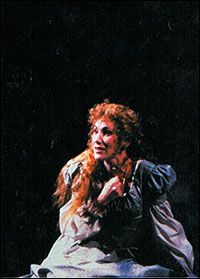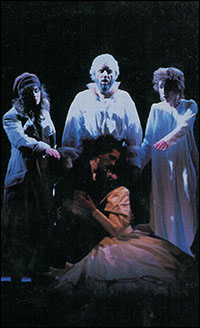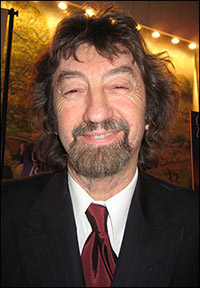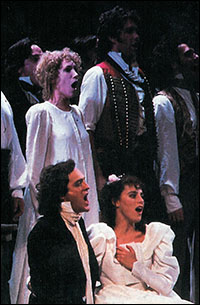
Randy Graff
Randy Graff, a Tony Award winner for her dazzling work in the dual roles of Oolie and Donna in Cy Coleman and David Zippel's City of Angels, is one of our great singing actresses. Graff, who was also Tony-nominated for her work in A Class Act, epitomizes what I enjoy most in a musical theatre artist: simple, straightforward, concentrated singing that is delivered in a heartfelt and ultimately moving manner. Just listen to her beautiful and touching rendition of A Class Act's "The Next Best Thing to Love" on that show's cast recording. The New York native, who also scored in the Broadway comedies Laughter on the 23rd Floor and Moon Over Buffalo, has the distinction of creating the role of the ill-fated Fantine in the original Broadway company of the international hit Les Misérables, which makes its way to U.S. cinemas Christmas Day featuring a cast led by Hugh Jackman, Russell Crowe and Anne Hathaway. Earlier this week I had the pleasure of catching up with the gifted Graff, who reminisced about auditioning for, landing the role of, rehearsing and playing Fantine in the 1987 Broadway debut of Les Misérables; that brief chat follows.
Question: Take me back to about a month before you heard about the Les Miz audition. What had you done in New York at that time, and what, if you remember, were your career goals at that point?
Randy Graff: Prior to Les Miz, I was an understudy for Grease on Broadway. I understudied five parts, and I made my Broadway debut in a big bomb called Saravà. [Laughs.] And, I was doing a lot of regional theatre and Off-Broadway theatre, and I'll tell you — I have a very vivid memory. I was at the Broadway Theatre doing Saravà, and I was on the fire escape talking to P.J. Benjamin, who I later worked with opposite in Damn Yankees. Anyway, we were just talking when we were getting ready to close Saravà. It only ran six months. We actually didn't open — we previewed for six months. That's the big joke in the industry. We never really opened! [Laughs.] So, here's the memory: I was looking at the intersection of the signs at 52nd and Broadway, and I though to myself, "When will I ever be back here again?" And, that was '78. Eight years later, I was back at the Broadway in Les Miz at that very theatre.
Question: Before Les Miz, did you ever have doubts whether it would ever happen for you — that kind of success?
Graff: No. I knew it would happen, I just didn't know when. I wanted it to happen in a timely fashion, where I was ready and prepared for it. I didn't want it to happen too quickly. So when Les Miz happened, which was huge for everyone involved, I was thrilled, but I wasn't afraid of it. I felt ready and prepared.
 |
||
| Graff as Fantine |
Graff: I was very aware of it. I listened to the recording of Patti [LuPone] singing, and I thought, "Oh, I want to play that part. I want to audition for that part." And, I actually called Andy Zerman, who's a friend of mine who was casting for Johnson-Liff, and I said, "I really want to be seen for Fantine." And, he said, "We'll make sure we get you in." I had an agent at the time, but I just thought, "Why not? I'm going to call my friend Andy as well." And, they saw me, and I had a callback, and I was told that Patti, which is true, had first refusal on the Broadway company, so I had to wait a month for her to decide whether or not she was going to do it. And, I'll tell you exactly where I was when I found out — I was in the middle of an orchestra rehearsal for Fiddler, playing Tzeitel at Civic Light Opera. We were on a break, and I walked passed the stage manager's office, and there was a note in my box that said, "Call Johnson-Liff." And, I thought, "Well, they're not calling me to tell me I didn't get it." [Laughs.] And, I called them on a pay phone — no cell phones! And, Andy being a friend and Vinny [Liff] being a friend, because I knew them both from Grease, said, "You got it!" And, I just started jumping up and down and screaming, and Pat Quinn — God rest his soul — came down because everybody knew that I was waiting to hear. The whole company knew that I was waiting to hear. He heard me screaming, and he came down the stairs and said, "You got Fantine! You got Fantine! You got Fantine!" [Laughs.] And, we were both screaming and were shushed by the stage manager. But that's how I found out — it was fantastic.
Question: Do you remember what the audition process was like? Did they have you sing from the show?
Graff: Yeah, the first audition, everyone sang their own song, so I sang "Where is the Warmth?" That was my big audition song. Question: That's one of my favorite songs.
Graff: Isn't it beautiful? Such a great song.
Question: And, no one does it anymore! Everyone does "Meadowlark."
Graff: I know! I give it to my students all the time, and I say, "Forget 'Meadowlark.' Sing this. This is better." I sang "Where is the Warmth?" and I was called back to sing "I Dreamed a Dream." And, I worked on it with my voice teacher. I was very, very, very nervous for my callback. I remember that.
 |
||
| Graff (right, standing) in the Finale. |
Graff: The rehearsal process was totally inspiring and awesome because we actually improv'd for two weeks. We didn't get to the text until the end of — I can't remember specifically — but I think it was two weeks. Two weeks of improv to get the company to trust each other and work together and bond. We were doing improvs that actually worked themselves into the show because Trevor [Nunn] and John [Caird] didn't want to do what was done in London. They wanted to [reinvent] it. We did some typical theatre exercises that you do in college just to sort of shed your inhibitions — trust exercises where we'd fall into each other's arms, and machine exercises, where we'd all have to come and be part of a machine. And, there's an infamous cartoon character exercise, where we made a big circle and we were asked to perform our favorite cartoon character, and we all felt like fools, and that's exactly what they wanted. [Laughs.] They wanted us to feel foolish in front of each other. I mean, you ask any original Les Miz cast member about the cartoon exercises, and they'll just make a face — "Ah!" It was so awful. [Laughs.] So we did that, and then we started to tackle the text, but there's a lot of improv work that really bonded the company. Did you ever hear from anyone else about the famous prostitution exercises?
Question: I haven't.
Graff: [Laughs.] This is funny. Trevor took the guys in one room, and John Caird took the women in another room. And, this was preparation for what "Lovely Ladies" was going to become, and he had all of the women — one at a time — walk in front of him as if they were prostitutes in that time, meaning they had some sort of an affliction. So we had to walk across with whatever it was — whether we were missing a limb, or whether we were completely ill with consumption like Fantine. But we had to still show how beautiful we felt inside and show off the part of us that we still felt was beautiful and attractive and sexy to men. We all had to go across the room, one at a time, in front of John Caird. [Laughs.] He loved the exercise! Trevor would always say, "Where's John?" … "Oh, he's doing the prostitution exercise." [Laughs.] It was really something. Then, after that, all of the women went into the room with the men, and until this day I don't know what they were doing with Trevor in that room, and we had to do the exercise — not one at a time — as a group, as the "Lovely Ladies" group, and then go pick the person we wanted to seduce and sort of "work" them the way we did with John. And, that became the "Lovely Ladies" scene. It was born from that improv. It was great. And, it worked! [Laughs.] Ask the guys. It worked!
 |
||
| Trevor Nunn |
Graff: Well, I did do my research by reading the novel. Truthfully, I read the abridged version of the Victor Hugo novel, and then I read the full passage on Fantine in the unabridged, and everything I needed to know about Fantine was in that section. There were things in that section — physical things — that I applied on stage. He talked about how she was crawling around on her hands and knees like a dog before Javert… And, also, by that point, she's just so drunk. I mean, the thing about Fantine is that she was high all the time on absinthe. He talked about how she is just high to numb the pain that she was in when she became a prostitute, so I really used that through all of "Lovely Ladies." I didn't fight being a prostitute; I just surrendered to it and played it like I was numb — that's right out of the novel. She was high all the time on absinthe, which is an opiate. And, as far as "I Dreamed a Dream" is concerned… It just came out of the scene for me, organically — from the journey that Fantine travels up until that point. I didn't have to think very much about it. I just let it happen. Question: What was audience reaction like from the first preview?
Graff: Well, I'll tell you, when were in D.C., the first preview was amazing. The audience was on its feet at the end, and they would just not leave the theatre. We were all downstairs in the Kennedy Center dressing rooms, and John Caird came down to my dressing room — I was starting to get undressed, and he said, "Put your costume back on. They're still standing." I ran upstairs, and Fantine's barefoot in the last scene, as the ghost, and I ran upstairs and ran across the stage with the rest of the company to take another bow because they wouldn't leave the theatre, and I cut my toe on one of the grates that Thénardier pops out of. And, it was sort of gushing blood all through that curtain call, and after that they gave me ballet slippers to take my curtain call in, which is why all the Fantines wear ballet slippers in the curtain call. [Laughs.]
 |
||
| Graff in the Finale. |
Graff: [Laughs.] I did all sorts of things. The first thing I did — and Diane [Fratantoni, now Diane Sutherland], she was the first Fantine on the road — she actually did the same thing that I did. Because of the gamut of emotions that you run as Fantine in such a short, intense time, I was just sort of emotionally and psychologically exhausted by the end of my little 45-minute marathon on stage, so I would immediately, when I got into my dressing room, eat chocolate. I had chocolate in my dressing room all the time, so I would just eat a lot of chocolate, and I'd get my energy back up, and then I would do all sorts of things — be on the phone, balance my checkbook, visit with the Lovely Ladies… Fantine is actually in the end of Act One. It's a crossover that she's in as a boy, and then she plays the boy at the barricade, so there wasn't as much time as people think.
Question: There were two major TV appearances where you performed "I Dreamed a Dream" — Phil Donahue and "The Tonight Show." What were each of those experiences like for you?
Graff: The first one was "The Tonight Show" — exciting and totally nerve-wracking. I was incredibly nervous on "The Tonight Show" — because it was the "Tonight Show," because it was Johnny Carson, because I was going before millions of people and singing "I Dreamed a Dream" on television for the first time. I had a great time talking to Johnny Carson. I had a hard time with the song because the music was very weird and out of sync, and because I was so nervous, I just felt really kind of vocally tight, and it wasn't the best performance I had given of that. Having said all that, it was absolutely thrilling. He was so kind and so wonderful to me, and I feel so incredibly lucky that I got to talk to Johnny Carson. [Laughs.] And, I still have the little sign from my dressing room that says, "The Tonight Show" with a half moon on it that says, "Randy Graff. The Tonight Show." He was a total gentleman.
Question: And, the Phil Donahue appearance was after?
Graff: Yeah, it was after. That one was really great because the panel was Neil Simon, Joe Papp and Jackie Mason, who was on Broadway at the time — a weird trio — [laughs] and they were talking about the 1987 season, and they had a bunch of us. Laurie Beechman was there singing "Memory," and I was there, and we were all in costume. I have a picture of it somewhere. It's the funniest picture. We were all in the greenroom, and she's dressed up as Grizabella, and I'm Fantine, and the Starlight Express people were there. It's the oddest picture. That one, even though it was eight o'clock in the morning, I was much more relaxed because I was in character in the Fantine costume, and it just felt more familiar, and the track from Broadway — I sang it to a track — so it just felt more familiar and comfortable.
Question: Looking back, why do you think Les Misérables has had such international success?
Graff: Wow. Yeah, it's amazing. It's such a phenomenon. I think the themes of love and redemption are universal. I think the music is beautiful, and it's an incredible story, and people respond to that. We'll always respond to a good story, and Les Miz has a great story. And, also, it was quite a sight, technically. I don't know if we had ever seen anything like that yet — maybe with Phantom. But I felt like I was doing Nicholas Nickleby with a turntable. It had the spectacle, and it had the substance. I think that's what's carried it through the years.
Question: How do you feel about having created Fantine on Broadway?
Graff: Really, really, really privileged. Totally privileged. Question: Are you excited to see the movie?
Graff: I cannot wait to see the movie. I think they've got a great cast, and I was reading online that they sing live. That'll be great; they'll really get to act it… It gives the actors such freedom to just act the song, so I'm looking forward to that. I think the cast that they've put together is terrific. I can't wait, and I'm really excited to see Frances [Ruffelle] because she does a "Lovely Lady" cameo, and to see Colm [Wilkinson] as the priest. I think that's going to make me cry.
Question: What's happening for you now? Are there any projects that you can talk about that you're working on?
Graff: I've been doing a lot of readings lately — readings that you kind of hope will turn into something, but I don't really like to talk about that. You never know what's going to happen, but I've been pretty busy doing readings. And, I teach regularly at Primary Stages, and I'm actually going to Toronto to do a weekend master class. I've really been enjoying teaching and passing on what I've learned over the years. It's been very gratifying.
Well, that's all for now. Happy diva-watching! E-mail questions or comments to [email protected].










